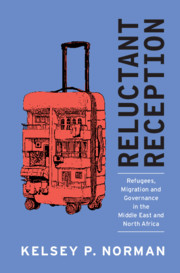Book contents
- Reluctant Reception
- Reluctant Reception
- Copyright page
- Dedication
- Epigraph
- Contents
- Figures
- Tables
- Acronyms
- Note on Translation
- Preface
- 1 Introduction
- 2 Host State Engagement in the Middle East and North Africa
- 3 Egypt
- 4 Morocco
- 5 Turkey
- 6 Differential Treatment by Nationality?
- 7 The Domestic Influence of International Actors
- 8 The Post-2015 Migration Paradigm in the Mediterranean
- 9 Conclusion and Avenues Forward
- Book part
- Notes
- References
- Index
8 - The Post-2015 Migration Paradigm in the Mediterranean
Published online by Cambridge University Press: 26 November 2020
- Reluctant Reception
- Reluctant Reception
- Copyright page
- Dedication
- Epigraph
- Contents
- Figures
- Tables
- Acronyms
- Note on Translation
- Preface
- 1 Introduction
- 2 Host State Engagement in the Middle East and North Africa
- 3 Egypt
- 4 Morocco
- 5 Turkey
- 6 Differential Treatment by Nationality?
- 7 The Domestic Influence of International Actors
- 8 The Post-2015 Migration Paradigm in the Mediterranean
- 9 Conclusion and Avenues Forward
- Book part
- Notes
- References
- Index
Summary
Chapter 7 examines migration policy, diplomacy and security in the Mediterranean region as a whole in the wake of the 2015 European refugee ‘crisis,’ after which the stakes and power (im)balances between unwilling receiving counties in Europe and host countries of the Middle East were renegotiated and reconstituted. It argues that all host states in the Mediterranean region, as well as sending states further afield in sub-Saharan Africa, benefitted from Europe’s post-2015 political crisis and used migration diplomacy to extract more concessions than they were able to previously. Europe’s shirking of responsibility toward asylum-seekers who successfully arrived on its territory in 2015 also had global ramifications for the way in which Global South countries considered their own responsibilities. Chapter 7 considers Kenya’s 2016 decision to close Dadaab refugee camp, the ongoing issue of the return of Syrian refugees from Lebanon, Jordan and Turkey, and the amplification of the EU-Turkey model for outsourcing European refugee hosting responsibilities. It also examines the implications for individual migrants and refugees stuck on Greek islands, returned by boat to Libya, or residing semi-permanently in countries like Egypt, Morocco and Turkey.
- Type
- Chapter
- Information
- Reluctant ReceptionRefugees, Migration and Governance in the Middle East and North Africa, pp. 169 - 187Publisher: Cambridge University PressPrint publication year: 2020

